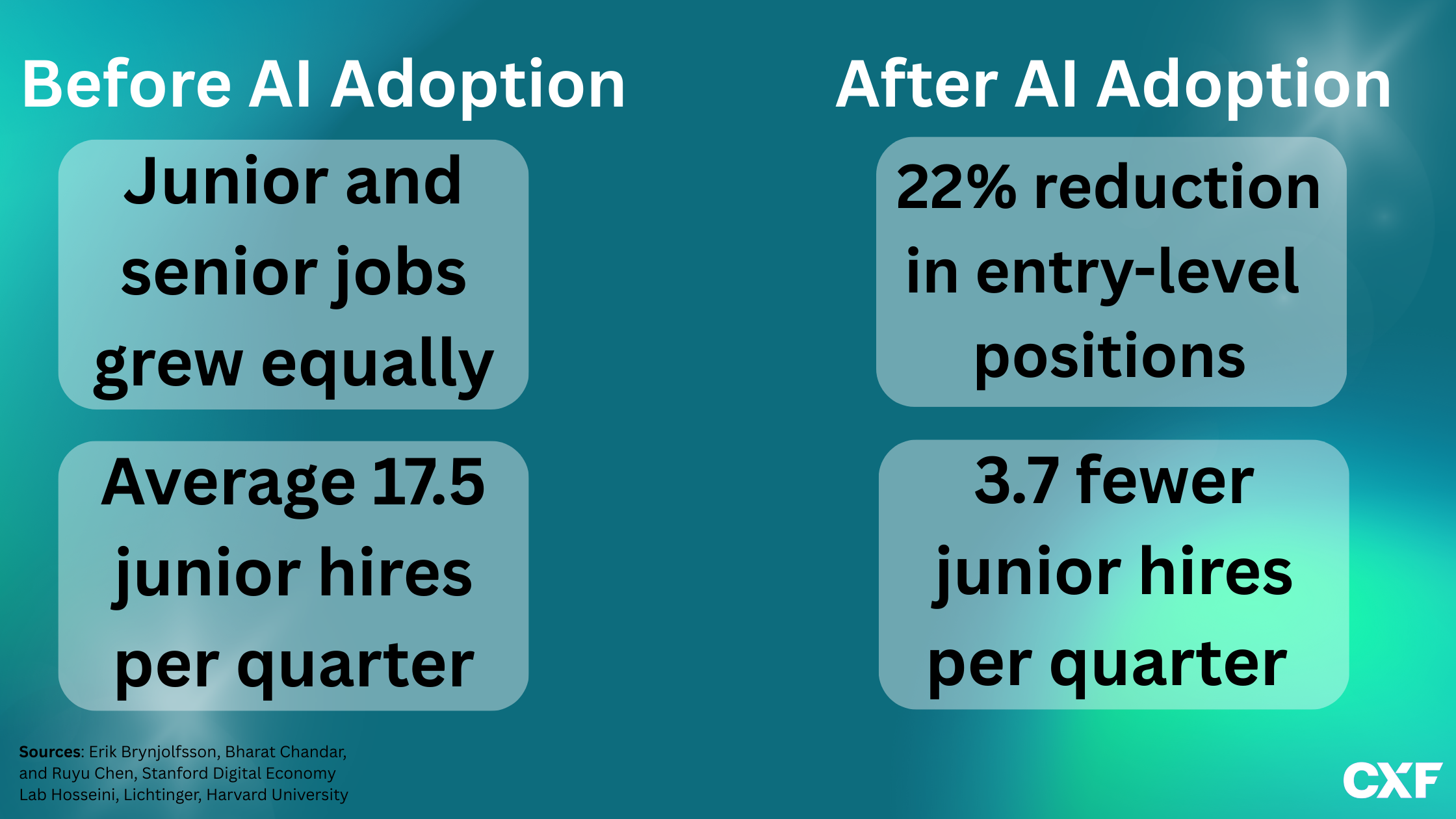September 2, 2025 • 5 min read
The End of Entry-Level Work? How AI Is Reshaping The Job Market

CX Analyst & Thought Leader
September 2, 2025

While executives feverishly monitor the ROI of their AI investments and dream about the next disruptive technology, they’re also ignoring a stark reality: the AI technology they’re raving about is quietly eliminating the bottom rungs of the career ladder.
There’s a real fear that AI will eventually create an even greater income divide than already exists. Alarm bells about the potential economic and political impact of mass AI adoption are ringing everywhere.
Here’s what the numbers tell us so far about AI’s impact on the job market.
AI’s Impact on Junior vs Senior Employment
Before AI adoption (from 2015-2022) junior and senior roles grew at similar rates. Things began to shift in the first quarter of 2023, when rapid AI adoption started to become the norm. Soon, a significant divide emerged between companies that adopted AI versus companies that resisted it. And while AI adopters experienced all the benefits of automation, there was one group in particular that suffered: junior (entry-level) employees.
Within 1.5 years (from Q12023-Q32024) the number of junior employees at businesses that adopted AI fell by 7.7% compared to non-adopters.[*] Senior positions (associate and above) however, continued on its upward trend. And when you compare junior vs senior jobs at the same company after AI adoption? Junior positions declined by 12%.[*]
While we may be inundated with articles and studies claiming that CEOs and other executives are worried about losing their jobs to AI, the truth is that AI adoption hasn’t impacted senior employees as much as they feared. Instead, it has disproportionately impacted junior employees. For example, a 10-point increase in AI exposure eliminates about 11% of entry level positions, it also causes a 7% rise in senior roles.[*]

AI-Related Job Loss
The truth is that we’re not thinking about AI-related job loss, particularly related to entry-level positions, in the right way. It’s not necessarily about laying off existing employees. It’s about never hiring them in the first place, because AI has eliminated the need for their positions.
Since the first quarter of 2023, AI adopters have actually decreased employee termination by nearly 1 point, and have increased junior-to-senior promotions by about half a point. However, AI adopters have reduced their junior hiring numbers by 22%. Junior jobs are under particular threat, as AI can automate away nearly all of their job requirements. Between Q1 2023 and early 2025, entry level job postings have dropped by about 35%.[*]
The real issue isn’t that you’ll be fired because AI can do your job faster and better than you. It’s that you’re never going to get hired in the first place.
Does Your College Degree Even Matter Anymore?
AI has inarguably made it harder for young people to get hired for entry-level positions – and even college graduates aren’t immune. In Q2 2025, recent college graduates faced a nearly 6% unemployment rate: the highest since 2013 (and that’s excluding all the COVID-era shakeups.)[*]
The hiring decline most impacts junior jobseekers with college degrees from mid-tier universities. While junior employees graduating from both elite and low-prestige colleges both faced similar and smaller levels of hiring decline, mid-tier grads have faced the greatest level of job reductions from AI adoption.
Young, college-educated people are struggling to get their foot in the door, and are being forced to adapt to AI’s impact on the job market. This only compounds the fear that entry-level positions will perpetuate a cycle of nepo baby-only employment. However, mass AI adoption also led to a boom in trade school applications and self-employment, as young people favor what they perceive as “AI-proof jobs.”
Industries Most Impacted By AI Adoption
The AI adoption-driven junior hiring decline has hit some industries harder than others, and is most prevalent in the retail and wholesale sector. AI adopters within the retail industry reduced junior hires by 40% per quarter compared to non-adopters.[*]
Available entry-level positions in professional services (consulting, marketing, accounting, paralegal, etc.) have also sharply decreased since 2023. IT and tech junior positions have dropped by roughly 35% since January 2023.[*]
AI and Job Creation
While AI skeptics focus on the job loss it can cause, optimists focus on the new company roles introduced by AI-related changes. In fact, 39% of businesses are already introducing new positions to manage and monitor AI implementation and management. The optimists may have a point: while AI and information processing are expected to eliminate 9 million jobs by 2030, they’ll also help create 11 million new positions – for a net job increase of 2 million.[*]
Potential roles created by AI include:
- AI Governance and Compliance Specialists
- AI Risk Managers
- AI Integration Engineers
- AI Ethicists and Analysts
- AI Trainers
- GEO Specialists
- AI Analytics Translators
- Conversation Designers
- Data Literacy Educators
- AI Platform Architects
- Industry-Specific AI Specialists